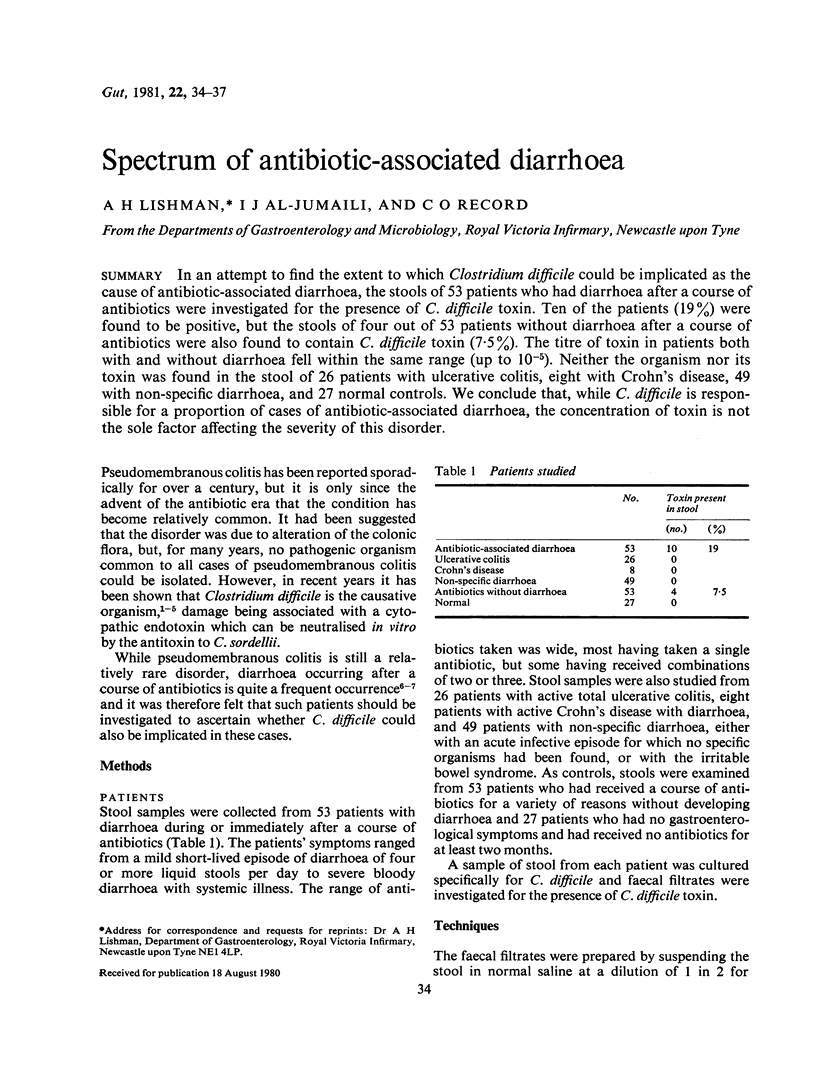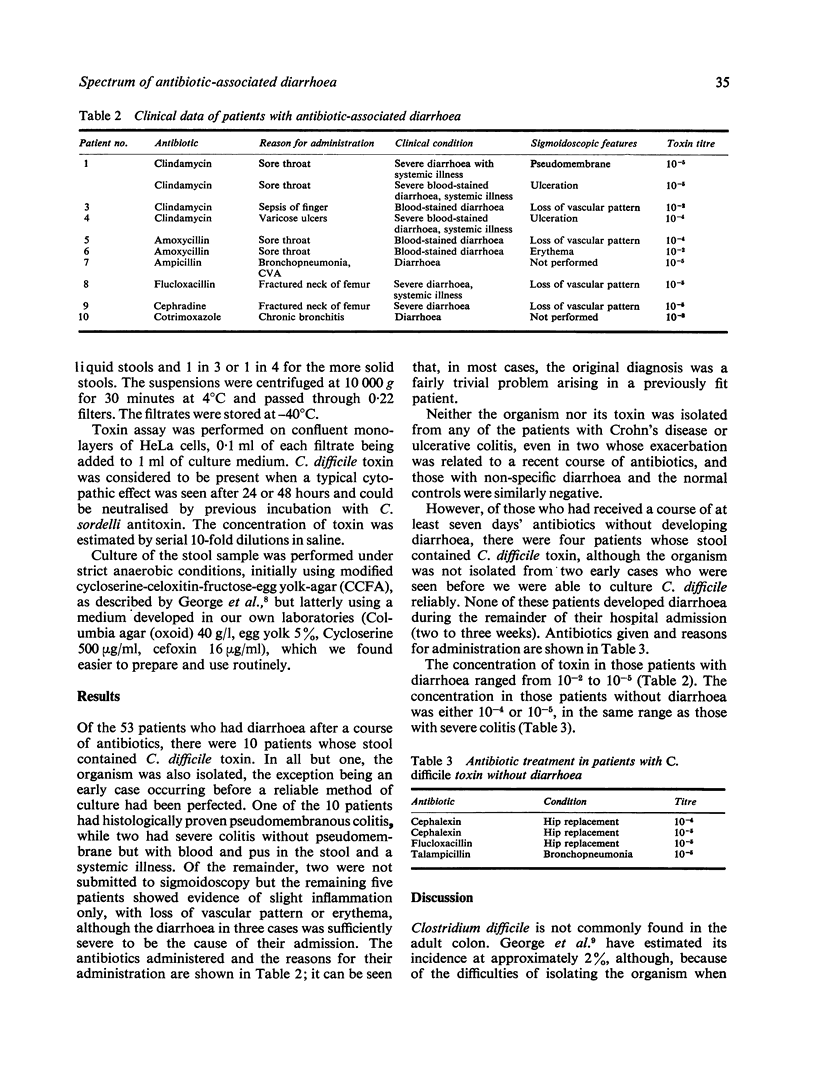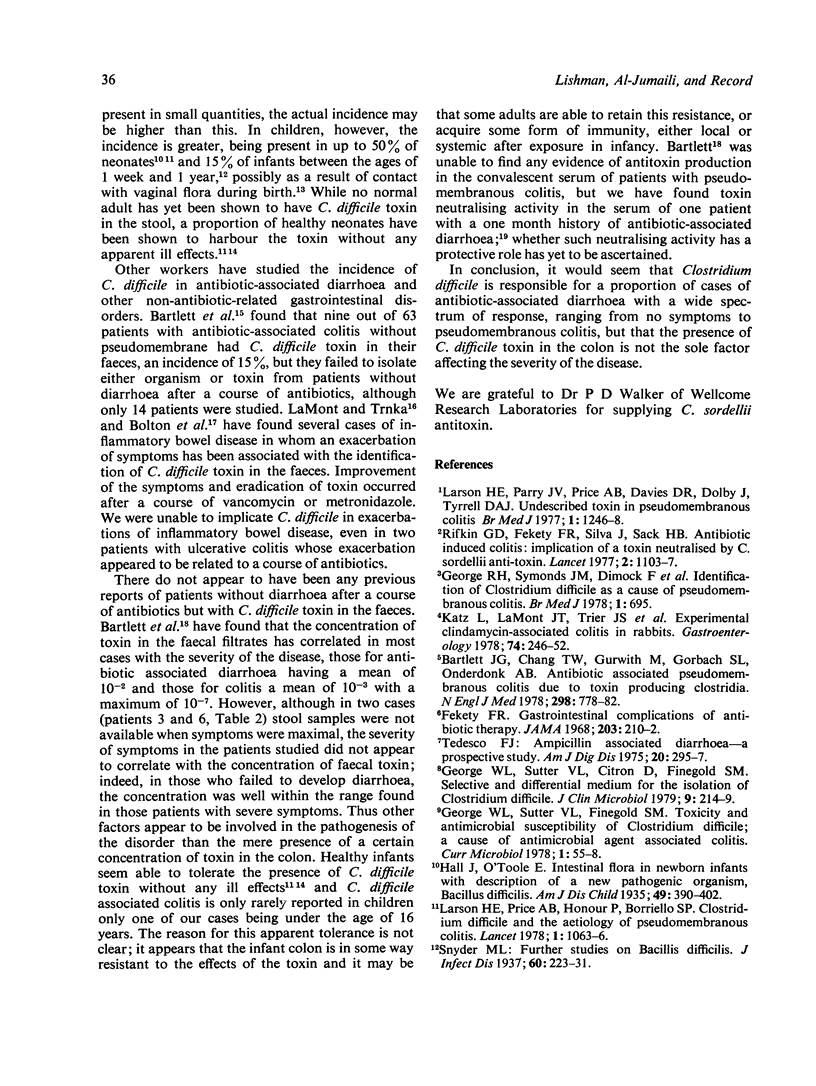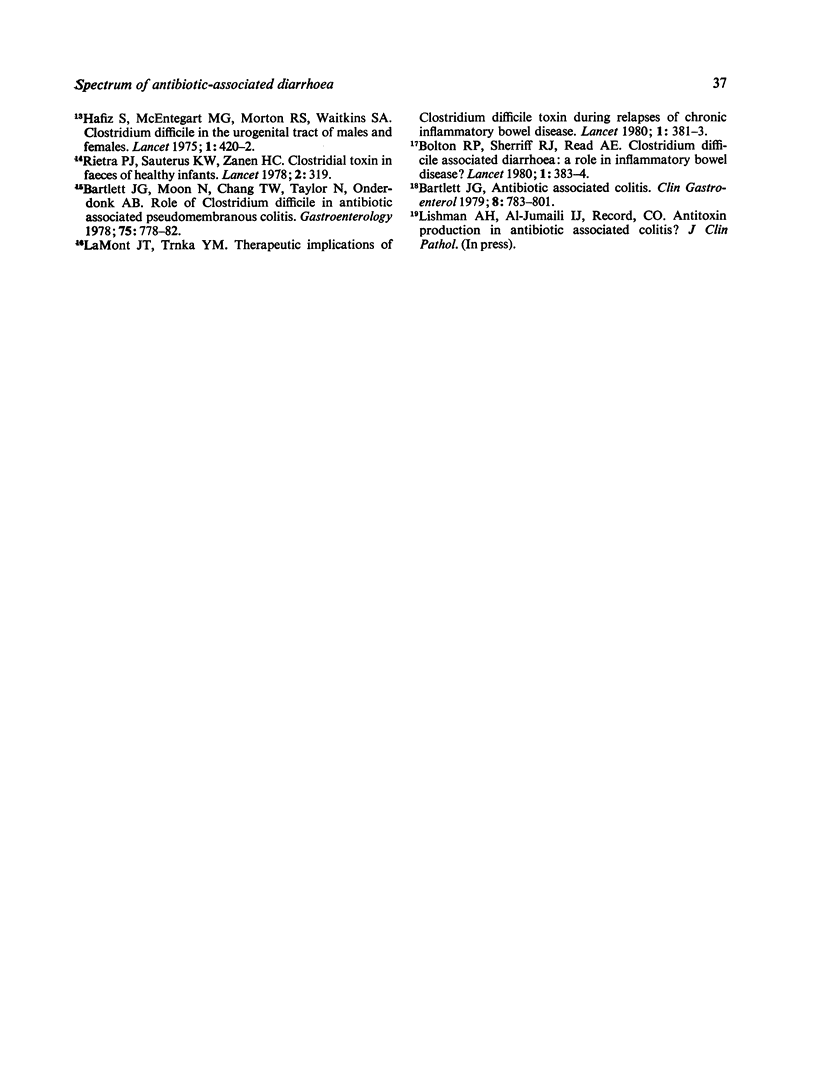Abstract
In an attempt to find the extent to which Clostridium difficile could be implicated as the cause of antibiotic-associated diarrhoea, the stools of 53 patients who had diarrhoea after a course of antibiotics were investigated for the presence of C. difficile toxin. Ten of the patients (19%) were found to be positive, but the stools of four out of 53 patients without diarrhoea after a course of antibiotics were also found to contain C. difficile toxin (7.5%). The titre of toxin in patients both with and without diarrhoea fell within the same range (up to 10(-5)). Neither the organism nor its toxin was found in the stool of 26 patients with ulcerative colitis, eight with Crohn's disease, 49 with non-specific diarrhoea, and 27 normal controls. We conclude that, while C. difficile is responsible for a proportion of cases of antibiotic-associated diarrhoea, the concentration of toxin is not the sole factor affecting the severity of this disorder.
Full text
PDF



Selected References
These references are in PubMed. This may not be the complete list of references from this article.
- Bartlett J. G. Antibiotic-associated colitis. Clin Gastroenterol. 1979 Sep;8(3):783–801. [PubMed] [Google Scholar]
- Bartlett J. G., Moon N., Chang T. W., Taylor N., Onderdonk A. B. Role of Clostridium difficile in antibiotic-associated pseudomembranous colitis. Gastroenterology. 1978 Nov;75(5):778–782. [PubMed] [Google Scholar]
- Bolton R. P., Sherriff R. J., Read A. E. Clostridium difficile associated diarrhoea: a role in inflammatory bowel disease? Lancet. 1980 Feb 23;1(8165):383–384. doi: 10.1016/s0140-6736(80)90940-x. [DOI] [PubMed] [Google Scholar]
- Curran W. J. Law-medicine notes. Legal liability in clinical investigations. N Engl J Med. 1978 Apr 6;298(14):778–779. doi: 10.1056/NEJM197804062981407. [DOI] [PubMed] [Google Scholar]
- Fekety F. R., Jr Gastrointestinal complications of antibiotic therapy. JAMA. 1968 Jan 15;203(3):210–212. [PubMed] [Google Scholar]
- George R. H., Symonds J. M., Dimock F., Brown J. D., Arabi Y., Shinagawa N., Keighley M. R., Alexander-Williams J., Burdon D. W. Identification of Clostridium difficile as a cause of pseudomembranous colitis. Br Med J. 1978 Mar 18;1(6114):695–695. doi: 10.1136/bmj.1.6114.695. [DOI] [PMC free article] [PubMed] [Google Scholar]
- George W. L., Sutter V. L., Citron D., Finegold S. M. Selective and differential medium for isolation of Clostridium difficile. J Clin Microbiol. 1979 Feb;9(2):214–219. doi: 10.1128/jcm.9.2.214-219.1979. [DOI] [PMC free article] [PubMed] [Google Scholar]
- Hafiz S., McEntegart M. G., Morton R. S., Waitkins S. A. Clostridium defficiel in the urogenital tract of males and females. Lancet. 1975 Feb 22;1(7904):420–421. doi: 10.1016/s0140-6736(75)91489-0. [DOI] [PubMed] [Google Scholar]
- Katz L., LaMont J. T., Trier J. S., Sonnenblick E. B., Rothman S. W., Broitman S. A., Rieth S. Experimental clindamycin-associated colitis in rabbits. Evidence of toxin-mediated mucosal damage. Gastroenterology. 1978 Feb;74(2 Pt 1):246–252. [PubMed] [Google Scholar]
- LaMont J. T., Trnka Y. M. Therapeutic implications of Clostridium difficile toxin during relapse of chronic inflammatory bowel disease. Lancet. 1980 Feb 23;1(8165):381–383. doi: 10.1016/s0140-6736(80)90939-3. [DOI] [PubMed] [Google Scholar]
- Larson H. E., Parry J. V., Price A. B., Davies D. R., Dolby J., Tyrrell D. A. Undescribed toxin in pseudomembranous colitis. Br Med J. 1977 May 14;1(6071):1246–1248. doi: 10.1136/bmj.1.6071.1246. [DOI] [PMC free article] [PubMed] [Google Scholar]
- Larson H. E., Price A. B., Honour P., Borriello S. P. Clostridium difficile and the aetiology of pseudomembranous colitis. Lancet. 1978 May 20;1(8073):1063–1066. doi: 10.1016/s0140-6736(78)90912-1. [DOI] [PubMed] [Google Scholar]
- Rietra P. J., Slaterus K. W., Zanen H. C., Meuwissen S. G. Clostridial toxin in faeces of healthy infants. Lancet. 1978 Aug 5;2(8084):319–319. doi: 10.1016/s0140-6736(78)91723-3. [DOI] [PubMed] [Google Scholar]
- Rifkin G. D., Fekety F. R., Silva J., Jr Antibiotic-induced colitis implication of a toxin neutralised by Clostridium sordellii antitoxin. Lancet. 1977 Nov 26;2(8048):1103–1106. doi: 10.1016/s0140-6736(77)90547-5. [DOI] [PubMed] [Google Scholar]
- Tedesco F. J. Ampicillin-associated diarrhea--A prospective study. Am J Dig Dis. 1975 Apr;20(4):295–297. doi: 10.1007/BF01237785. [DOI] [PubMed] [Google Scholar]


